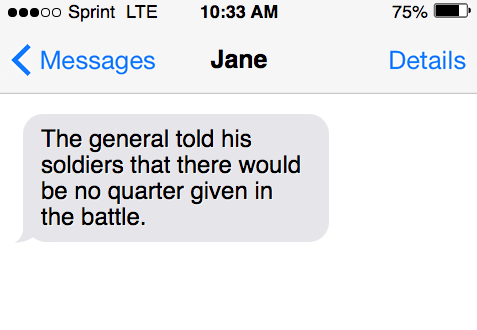What does the idiom “no quarter given” mean? Is it used in modern English? Where did it originate? If you’re curious about the idiom, you could be surprised about its original intent.
Learn what “no quarter given” means in this short grammar guide…
What does “Give no quarter’ and “No quarter given” mean?
The idiom ‘give no quarter’ or ‘no quarter given’ refers to showing no mercy. The phrase originated in the sixteenth century when soldiers would give no quarters to the enemy and kill them on the field of battle. While no quarter implied killing someone, in today’s times, it is interpreted as showing no mercy.

Other references to “no quarter given”
A sportsperson would show no mercy while playing a match and do their best to defeat their opponent. The phrase ‘no quarter given’ can be used in this situation. There is no killing happening here, but it shows the ruthless attitude of the sportsperson.
Similarly, when policemen give no quarter, they will enforce law and order without any second thought.
The way someone is treated
The phrase also means treating someone in a very harsh or stern way. When a teacher gives no quarter, they will treat the student sternly.
It could be in terms of assessing the student strictly or punishing the student for any wrong thing done. This term thus depends on the situation in which it is used.
On a battlefield, it could refer to the old meaning of slaying the enemy before they slay you. In today’s time, it is against international conventions to kill enemy soldiers.
So, it could be interpreted as asking the enemy to surrender or face a terrible battle where they lose their lives.
Slang and every day references
Even a mother could use this term for her kids. When she says she will give no quarter, she shows no sympathy to them.
In this situation, it is meant to scare the kids and get them to be disciplined and follow her instructions.
Origins of the idiom “no quarter given”
The idiom ‘no quarter given’ can be traced back to the sixteenth century. This was the time when great nations explored the world going on conquests.
This was also the time when there were wars and battles everywhere. In this context, quarter refers to barracks or places where prisoners of war would be lodged.
In a war, the side that lost would surrender, and its soldiers/fighters would be jailed. The phrase’ no quarter meant that the losing side would not get housing. It also indicated the brutal truth that soldiers from the losing side would be executed after the war.
Soldiers extensively used the phrase on ships that would fight on the high seas.
Apart from soldiers, pirates would fight battles on the seas as they attacked ships. In this context, no quarter meant that the pirates would ruthlessly kill everyone on the ship they conquered.
Examples of “no quarter given” in a sentence
The following examples explain how the idiom ‘no quarter given’ can be used in a sentence to convey its meaning precisely.
- The general told his soldiers that there would be no quarter given in the battle.
- If you come in front of a rampaging bull, no quarter would be given.
- The pirate chief told his men, “Raise the red flag; there will be no quarter given to the soldiers on that ship.”
- The boxing champion had a policy of no quarter given when it came to boxing, irrespective of the match type.
- The judge told the accused’s lawyer, “Your client’s crime is so heinous. And the evidence is so convincing that there will no quarter given when I pronounce the judgment.”
“No quarters given” synonyms
Some synonyms for “no quarters given” are:
- No mercy
- No compassion
- No pity
- No sympathy
- No lenience
- No forgiveness
- Take no prisoners
What does the “no quarter’ flag mean?
Pirates used the “no quarter” flag to indicate to a ship that there would be no survivors in the battle that ensued. All those on the ship being raided would be punished. Pirates used a flag with skulls and bones called the Jolly Roger. Before attacking a ship, they would sometimes raise the red flag with the skull and bones.
The red flag was a message that there would be ‘no quarter given’. The people on the other ship were being given a message that if they fought, they would all be gone. Even those who survived the battle would be butchered. The implicit message was that they should surrender and hand over all they had to the pirates. Not doing so would lead to their being punished.
Incidentally, the Jolly Roger flag that is so popular came much later. Pirates would have a plain black flag to let others know they were pirates.
When they hoisted the red flag, it was a message asking the other ship to surrender or be punished without mercy.
Common questions
Questions about the idiom “no quarter given.”
Does the idiom mean that enemy combatants will be executed?
In the original sense, yes. “No quarter” means to show no mercy. Or that the other side would experience the war in a very harsh way.
Is “no quarter given” referring to money?
No, it is referring to mercy of a prisoner. Or the attemp to siege a boat or ship and the result of the army punishment.
Sources
- No Quarter Given – Meaning, Origin and Usage
- no quarter asked or given | English examples in context | Ludwig
- no quarter in a sentence – Ichacha
- Quarter Synonyms | Collins English Thesaurus
- Jolly Roger – Wikipedia
Inside this article
Fact checked:
Content is rigorously reviewed by a team of qualified and experienced fact checkers. Fact checkers review articles for factual accuracy, relevance, and timeliness. Learn more.
Core lessons
Glossary
- Abstract Noun
- Accusative Case
- Anecdote
- Antonym
- Active Sentence
- Adverb
- Adjective
- Allegory
- Alliteration
- Adjective Clause
- Adjective Phrase
- Ampersand
- Anastrophe
- Adverbial Clause
- Appositive Phrase
- Clause
- Compound Adjective
- Complex Sentence
- Compound Words
- Compound Predicate
- Common Noun
- Comparative Adjective
- Comparative and Superlative
- Compound Noun
- Compound Subject
- Compound Sentence
- Copular Verb
- Collective Noun
- Colloquialism
- Conciseness
- Consonance
- Conditional
- Concrete Noun
- Conjunction
- Conjugation
- Conditional Sentence
- Comma Splice
- Correlative Conjunction
- Coordinating Conjunction
- Coordinate Adjective
- Cumulative Adjective
- Dative Case
- Determiner
- Declarative Sentence
- Declarative Statement
- Direct Object Pronoun
- Direct Object
- Diction
- Diphthong
- Dangling Modifier
- Demonstrative Pronoun
- Demonstrative Adjective
- Direct Characterization
- Definite Article
- Doublespeak
- False Dilemma Fallacy
- Future Perfect Progressive
- Future Simple
- Future Perfect Continuous
- Future Perfect
- First Conditional
- Irregular Adjective
- Irregular Verb
- Imperative Sentence
- Indefinite Article
- Intransitive Verb
- Introductory Phrase
- Indefinite Pronoun
- Indirect Characterization
- Interrogative Sentence
- Intensive Pronoun
- Inanimate Object
- Indefinite Tense
- Infinitive Phrase
- Interjection
- Intensifier
- Infinitive
- Indicative Mood
- Participle
- Parallelism
- Prepositional Phrase
- Past Simple Tense
- Past Continuous Tense
- Past Perfect Tense
- Past Progressive Tense
- Present Simple Tense
- Present Perfect Tense
- Personal Pronoun
- Personification
- Persuasive Writing
- Parallel Structure
- Phrasal Verb
- Predicate Adjective
- Predicate Nominative
- Phonetic Language
- Plural Noun
- Punctuation
- Punctuation Marks
- Preposition
- Preposition of Place
- Parts of Speech
- Possessive Adjective
- Possessive Determiner
- Possessive Case
- Possessive Noun
- Proper Adjective
- Proper Noun
- Present Participle
- Prefix
- Predicate



